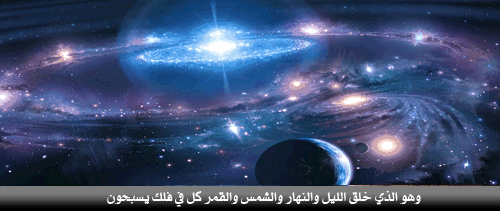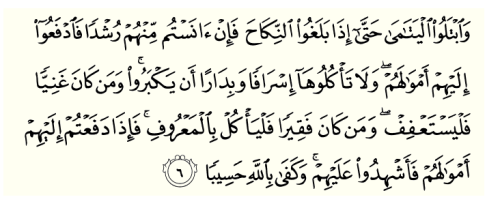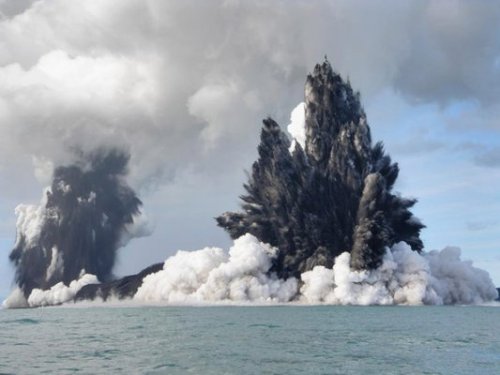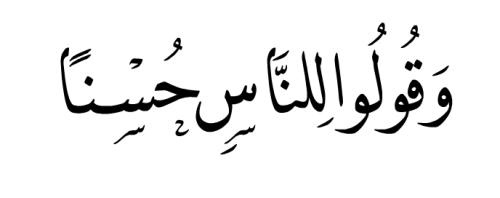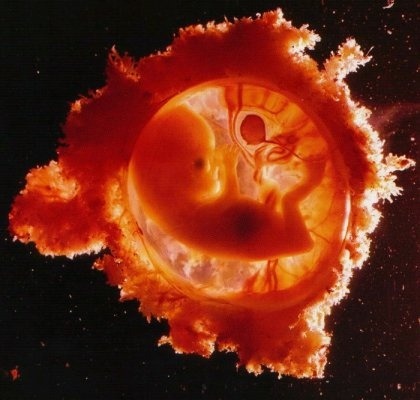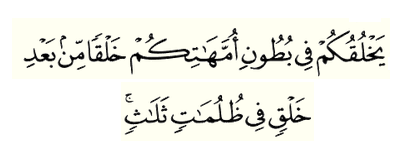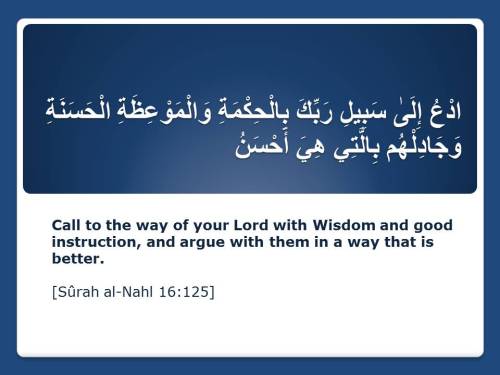Tuesday, December 4, 2012
PASS THE PILL!!!
PASS THE PILL !!! A Message to Muslims by Yusha Evans
Labels:
advice,
Dawah,
Innocence of Muslims,
Islam,
Israel,
Jesus,
Jihad,
Message,
Muhammad,
video,
Yusha Evan,
الدعوة,
الرحمة المهداة,
رسالة,
فيديو,
نصيحة
Tuesday, November 13, 2012
Saturday, November 10, 2012
A Good Life
A Good Life
The Quran proposes a ‘good life’ that is
spiritual and God-centered. It is a gift of God based on faith.
Living a ‘good life’ here is rewarded in the life that comes after death.
“Whoever does good, whether male or female, and is a believer,
We shall certainly make him live a good life, and We shall certainly give them
their reward for the best of what they did.” (Quran 16:97)
A good life is what most people want to live. It
is a life of happiness and fulfillment with little suffering, pain, or
sickness. Aristotle wrote about it. Several novels and plays have
been written on it. Singers like Tony Bennett have made it popular with
their songs. The American dream defined it to be richer, better, and
fuller for everyone in the form of good education, a well-paying job, and a
comfortable life. The state of Nebraska even chose ‘A Good Life’ to be
it’s promotional slogan.
God’s Word, on the other hand,
sets a slightly different standard for a good life. It bases a ‘good
life’ on spiritual contentment. It does not limit a good life tied to
superior education, material plenty, or the perfect body. It brings
happiness not from what lies outside, but from within. More accurately, a
‘good life’ is God centered.
God promises a ‘good life’ to
whoever does good deeds. What makes deeds ‘good’? It is not what people
define ‘good’ for themselves. Worst criminals justify their crimes.
Fighting parties do not think of themselves as anything but ‘good.’ A ‘good
deed’ is simply every good action that is listed in the Book that God has
revealed for humanity or it was taught by the prophet that God send.
Quran is the Book revealed by God and Prophet Muhammad is the last prophet He
send.
There are several points to be
noted:
1.
A ‘good life’ is promised by God to every
child of Adam, man or woman. It is an equal opportunity to attain
happiness for every human being. It does not matter where or when they
live. The recipe of success is the same for all. Male or female, all
are equal in the sight of how God rewards them in terms of the effort they put
in this life.
2.
The only requirement for the person is to
have faith. Faith in God is the foundation on which life must be
based. This ‘good life’ is not tied to wealth, family status, or
membership of a privileged class. They may be ingredients to happiness,
but without a connection with God they lose meaning. The way to have a
connection with God is to believe in His prophet as well. Therefore, a
person must have faith in God and His prophet. Only a person with faith
will perform works that are commanded by God and His prophet. Faith is
the driving force of any action acceptable to God.
3. The ‘good
life’ can be any form of comfort. It can be earning a decent livelihood
that does not contradict God’s teachings. It can be the inner feeling of
contentment whether one is rich or poor. Some state it is the pure joy of
worship. Think about it, someone who lives a ‘good life’ should love
someone or something. What greater joy can be there than loving God and
building a relationship with Him based on worship!
4. This life
is not the end of it. There is more after death. Living a ‘good
life’ on this earth is further rewarded by God in the eternal life to come
after death. God promises to reward men and women of faith with the best
actions they did in this life – and the reward is no less than eternal
Paradise.
5. Most
people work all their lives to have the perfect ‘good life.’ Whether it is
finding ways to make more money or going to college, yet not everyone is able
to live a life of happiness and fulfillment. Why? Because a ‘good life’
is a gift of God. He gives it to whom He wills.
6. Many
people put forth great services for fellow human beings. They make
discoveries, create inventions, find cures, build free clinics and schools, but
they lack faith. God does not wrong them. God pays them back in
this world, but in the life to come, they get nothing. God informs us in
the Quran,
“If anyone desires a harvest in the life to come, We shall
increase it for him; if anyone desires a harvest in this world, We shall give
him a share of it, but in the Hereafter he will have no share.” (Quran 42:20)
Such people do not serve
humanity to earn reward in the life to come; they do it to earn fame or to get
rich. They usually get what they worked for. That is their
reward. God states,
“But the deeds of those who disbelieve are like a mirage in
a desert: the thirsty person thinks there will be water but, when he gets
there, he finds only God, who pays him his account in full - God is swift in
reckoning.” (Quran 24:39)
Blessed is Allah, the best of creators.
{And it is He who created the night and the day and the sun and the moon; all [heavenly bodies] in an orbit are swimming.}
The Straight Path
The
Straight Path
What is the purpose of life?
{And [tell them that] I have not
created the invisible beings and mankind to any end other than that they may
[know and] worship Me. I do not desire from them any sustenance and I do not
desire that they should feed Me. Truly, God, He is The Provider, The Possessor
of Strength, The Sure.} Quran (51:56-58)
Who is the creator?
{Is not He (best) Who created the heavens
and the earth, and sendeth down for you water from the sky where with We cause
to spring forth joyous orchards, whose trees it never hath been yours to cause
to grow. Is there any god beside God? Nay, but they are folk who ascribe equals
(unto Him)! Is not He (best) Who made the
earth a fixed abode, and placed rivers in the folds thereof, and placed firm
hills therein, and hath set a barrier between the two seas? Is there any god beside God?
Nay, but most of them know not! Is not He
(best) Who answereth the wronged one when he crieth unto Him and removeth the
evil, and hath made you viceroys of the earth? Is there any god beside God?
Little do they reflect! Is not He (best) Who guideth you in the
darkness of the land and the sea, He Who sendeth the winds as heralds of His
mercy? Is there any god beside God? High Exalted be Allah
from all that they ascribe as partner (unto Him)! Is
not He (best) Who produceth creation, then reproduceth it, and Who
provideth for you from the heaven and the earth? Is there any god beside God?
Say: Bring your proof, if ye are truthful! } Quran (27:60-64)
Again: Who is He?!
{Say: He is Allah, the One! Allah
is Absolute, Eternal, Unique, Self-Sufficient, Perfect, Independent, the
Uncaused Cause of all that exists, Besought of all. He has not begotten and has
not been begotten, and, there is absolutely no one equal to Him; no one is even
remotely comparable.} Quran (112:1- 4)
Then Who is Jesus?!
{Jesus said: Truly, I am a servant of
God. He gave me the Book and He made me a
Prophet. He has made me blessed wherever I may be, and commissioned me to pray
and [pay] the welfare tax so long as I live; And (He has made me) dutiful to my
mother, and He has not made me arrogant, graceless. Blessed was I on the day I was
born, and blessed I shall be on the day I die and on the day I am raised to
life again.} Quran (19 : 30 - 31)
{Mention when God said: O Jesus son of Mary!
Remember My divine blessing on thee and on the one who is thy mother, when I
confirmed thee, Jesus, with the hallowed Spirit so that thou hast spoken to
humanity from the cradle and in manhood and when I taught thee the Book and wisdom and the Torah
and the Gospel and when thou hast created
from clay the likeness of a bird with My permission and thou hast breathed into
it and it becomes a bird with My permission and thou hast cured one blind from
birth and the leper with My permission and when thou hast brought out the dead
with My permission and when I limited the Children of Israel
from thee when thou hadst drawn near them with the clear portents. And those
who were ungrateful among them said: This is nothing but clear sorcery.} Quran
(5:110)
What about Moses?
{Have you heard the story of Moses? When he saw a fire and said to his family,
Wait here. I can make out a fire. Maybe I will bring you a brand from it, or
will find guidance there. Then when he came near to it, he was called by name:
"O Moses! Surely I am your Lord,
therefore put off your shoes; surely you are in the sacred valley, Tuwa, And I
have chosen you, therefore listen to what is revealed to you. "I am God,
there is no god but Me, so serve Me and hold the contact-method for My
remembrance.} Quran (20: 9 - 14)
Where I can find the truth?
{And thus did We reveal to you [O Muhammad,] an inspired
book by Our command. You did not know what the Book
was, nor (what) the faith (was), but We made it a light, guiding thereby whom
We please of Our servants; and most surely you show the way to the right path} Quran
(42: 52)
Muhammad?!
{Does it seem strange to people
that We have sent revelation to a man from among themselves, saying, Warn
mankind and give glad tidings to the believers that they have a true rank [of
honour] with their Lord? Those who deny the truth say, This man is clearly a
sorcerer. } Quran (10 : 2)
What shall I do?
{Believers, whether men or women,
must [act as] friends to one another; they should command decency and forbid
wickedness, keep up prayer, and pay the welfare tax as well as obey God and His messenger. Those God will grant mercy to; God is
Powerful, Wise! } Quran (9 : 71)
But What if I committed a sin?
{ And those who, when they
committed an indecency or did wrong to themselves, they remembered God. Then,
they asked for forgiveness for their impieties. And who forgives impieties but
God? And persist not in what impiety they committed while they know. To these
the reward will be forgiveness from their Lord and gardens with rivers flowing
underneath, eternally abiding in it. How excellent is this reward for the doers
(who do righteous deeds according to Allah’s Orders).}
Quran
(3 : 135 - 136)
Then?
The Day of the Judgment:
{When the heaven is cleft asunder.
And when the stars have fallen and scattered. And when the seas are burst
forth. And when the graves are turned upside down (and bring out their
contents) (Then) a person will know what he has sent forward and (what he has)
left behind (of good or bad deeds).} Quran (82 : 1 - 5)
What else?
Life of Bliss:
{Then as for him who will be given
his Record in his right hand will say: "Here! read my Record! "Surely,
I did believe that I shall meet my Account!" So he shall be in a life,
well-pleasing. In a lofty Paradise, The fruits in bunches whereof will be low
and near at hand. Eat and drink at ease for that which you have sent on before
you in days past!}
Quran (69 : 19 -
24)
Note!
{When God desires to guide someone,
He opens his breast to Islam; and whoever He
wills to let go astray, He causes his breast to be constricted as if he had to
climb up to the skies. That is how God heaps ignominy upon those who refuse to believe.} Quran (6 : 125)
Labels:
Article,
Gospel,
Islam,
Israel,
Jesus,
Jihad,
Life of Bliss,
Mary,
Maryam,
messenger,
Moses,
Muhammad,
purpose of life,
Quran,
Straight Path,
Torah
Orphans Properties.
{And test the orphans [in their abilities] until they reach marriageable age. Then if you perceive in them sound judgement, release their property to them. And do not consume it excessively and quickly, [anticipating] that they will grow up. And whoever, [when acting as guardian], is self-sufficient should refrain [from taking a fee]; and whoever is poor - let him take according to what is acceptable. Then when you release their property to them, bring witnesses upon them. And sufficient is Allah as Accountant.} Quran (4,6)
The Phenomenon of Mid-oceanic Volcanism.
The Phenomenon of Mid-oceanic Volcanism - During the second world war marine scientists observed, while searching for new minerals, that the sea floor of most ocean is torn by rifts from which magma and hot liquids gush out , even fire is sometimes seen over the surface of water.This important scientific fact is mentioned in the Holy Quran and the prophet’s word.God says in the Holy Quran what means: “And by the sea that is set on fire” (At-Tur: 6)
البحر المسجور الذي اقسم الله تعالى به في القرآن ولم يكتشف العلماء حقيقته إلا بعد أربعة عشر قرناً، يقول تعالى: (وَالطُّورِ * وَكِتَابٍ مَسْطُورٍ * فِي رَقٍّ مَنْشُورٍ * وَالْبَيْتِ الْمَعْمُورِ * وَالسَّقْفِ الْمَرْفُوعِ * وَالْبَحْرِ الْمَسْجُورِ * إِنَّ عَذَابَ رَبِّكَ لَوَاقِعٌ * مَا لَهُ مِنْ دَافِعٍ) [الطور: 1-8] سبحان الله
البحر المسجور الذي اقسم الله تعالى به في القرآن ولم يكتشف العلماء حقيقته إلا بعد أربعة عشر قرناً، يقول تعالى: (وَالطُّورِ * وَكِتَابٍ مَسْطُورٍ * فِي رَقٍّ مَنْشُورٍ * وَالْبَيْتِ الْمَعْمُورِ * وَالسَّقْفِ الْمَرْفُوعِ * وَالْبَحْرِ الْمَسْجُورِ * إِنَّ عَذَابَ رَبِّكَ لَوَاقِعٌ * مَا لَهُ مِنْ دَافِعٍ) [الطور: 1-8] سبحان الله
Tuesday, September 25, 2012
Say, [O Muhammad], "Praise be to Allah". قل الحمد لله
Beautiful recitation from Surat An-naml. Quran(27,59-64)
تلاوة مؤثرة من سورة النمل .القارئ محمود حجازي
{Say, [O Muhammad], "Praise be to Allah , and peace upon His servants whom He has chosen. Is Allah better or what they associate with Him?". [More precisely], is He [not best] who created the heavens and the earth and sent down for you rain from the sky, causing to grow thereby gardens of joyful beauty which you could not [otherwise] have grown the trees thereof? Is there a deity with Allah ? [No], but they are a people who ascribe equals [to Him]. Is He [not best] who made the earth a stable ground and placed within it rivers and made for it firmly set mountains and placed between the two seas a barrier? Is there a deity with Allah ? [No], but most of them do not know. Is He [not best] who responds to the desperate one when he calls upon Him and removes evil and makes you inheritors of the earth? Is there a deity with Allah ? Little do you remember. Is He [not best] who begins creation and then repeats it and who provides for you from the heaven and earth? Is there a deity with Allah ? Say, "Produce your proof, if you should be truthful."} Quran(27,59-64)
Labels:
Quran,
recitation,
Surat An-naml,
video,
تلاوة,
فيديو,
قران,
محمود حجازي
THREE ZONES
Labels:
Fetus,
Quran,
science,
scientific miracles,
wombs,
جنين,
رحم,
قران,
معجزات علمية
Sunday, September 16, 2012
Wednesday, September 12, 2012
Monday, September 10, 2012
Sunday, September 2, 2012
Saturday, September 1, 2012
Thursday, August 30, 2012
أفضل أنواع الذكر وكيفية الشكر
أفضل أنواع الذكر وكيفية
الشكر
أفضل أنواع الذكر قراءة القرآن، هو أفضل الذكر، فينبغي لكل مؤمن ومؤمنة الإكثار من قراءة
القرآن مع التدبر والتعقل، ولو كان لا يحفظه كثيراً، يقرأ ما تيسر منه، أو من المصحف
إذا كان يقرأ من المصحف، يكثر من ذلك، وإذا كان لا يقرأ من المصحف يقرأ ما حفظ،
الذي يحفظ الفاتحة ويكررها كثراً في أوقات كثيرة؛ لأنها أعظم سورة، وأفضل سورة في
القرآن العظيم، كل حرف بحسنة والحسنة بعشر أمثالها، وإذا كان يحفظ معها بعض السور
القصيرة كررها وأكثر منها في الليل والنهار، يرجوا ثواب الله -سبحانه وتعالى-،
وإذا كان يقرأ من المصحف قرأ من المصحف، من أوله إلى أخره كلما كمله عاد وقرأ من
أوله من الفاتحة، ثم أفضل الذكر بعد ذلك: "لا إله إلا الله وحده لا شريك له، له الملك
وله الحمد وهو على كل شيء قدير" هذا أفضل الذكر بعد القرآن "لا إله إلا الله وحده لا
شريك له، له الملك وله الحمد، وهو على كل شيء قدير"، "لا إله إلا الله وحده لا
شريك له، له الملك وله الحمد يحيي ويميت وهو على كل شيء قدير"، "لا إله إلا الله وحده لا
شريك له، له الملك وله الحمد يحيي ويميت بيده وهو على كل شيء قدير"، "لا إله إلا الله وحده لا
شريك له، له الملك وله الحمد يحيي ويميت وهو حيٌ لا يموت بيده الخير وهو على كل شيء قدير"، كل هذه أنواع من الذكر جاءت عن النبي -عليه
الصلاة والسلام-، يقول عليه الصلاة والسلام: (الإيمان بضع وستون شعبة – أو
قال: بضع وسبعون شعبة- فأفضلها قول: لا إله إلا الله)، وروي عنه -عليه الصلاة والسلام-
أنه قال: (خير الدعاء دعاء يوم عرفة، وأفضل ما قلت أنا والنبيون من قبلي: لا
إله إلا الله وحده لا شريك له، له الملك وله الحمد وهو على كل شيء قدير)، وقال -عليه الصلاة
والسلام-: (من قال لا إله إلا الله وحده لا شريك له، له الملك وله الحمد وهو
على كل شيء قدير عشر مرات كان كمن أعتق أربعة أنفس من ولد إسماعيل)، متفق على صحته، وقال
أيضاً: (من قال: لا إله إلا الله وحده لا شريك له، له الملك وله الحمد وهو
على كل شيء قدير مائة مرة في يومٍ كانت له عدل عشر رقاب، وكتب الله له مائة
حسنة، ومحا عنه مائة سيئة، وكان في حرزٍ من الشيطان يومه ذلك حتى يمسي، ولم يأت أحدٌ
بأفضل مما جاء به إلا من عمل أكثر من عمله)، هذا حديث عظيم رواه البخاري ومسلم في
الصحيحين، فينبغي لكل مؤمن ولكل مؤمنة الإكثار من هذا الذكر، وأن يقول ذلك مائة مرة كل يوم،
كل صباح يوم، أو في أثناء اليوم، أو في آخر اليوم، لكن إذا كان في الصباح يكون
أفضل، حتى يعم اليوم كله "لا إله إلا الله وحده لا شريك له، له الملك وله الحمد وهو على
كل شيء قدير" مائة مرة، وإن قال: يحيي يميت بيده الخير فكذلك مائة مرة: "لا إله إلا الله وحده لا
شريك له، له الملك وله الحمد يحيي ويميت بيده الخير وهو على كل شيء
قدير" مائة مرة كانت له
عدل عشر رقاب، يعني عدل عشر رقاب يعتقها في سبيل الله، عشر رقبات من العبيد، وكتب الله له مائة حسنة،
ومحا عنه مائة سيئة، فهذا خيرٌ عظيم، وكان في حرزٍ من الشيطان وهذا أيضاً فضل عظيم،
وكان في حرزٍ من الشطيان يومه ذلك حتى يمسي، ولم يأت أحدٌ بأفضل مما جاء به إلا رجل
عمل أكثر من عمله، فينبغي لكل مؤمن ولكل مؤمنة الإكثار من هذا وملازمته يومياً.
وهكذا الإكثار من قول: "لا إله إلا الله وحده لا شريك له، له الملك وله الحمد وهو على كل شيء قدير" عشر مرات، كلما حصل
فرصة قالها عشر مرات، يقول -عليه الصلاة والسلام-: (من قال: لا إله إلا الله
وحده لا شريك له، له الملك وله الحمد وهو على كل شيء قدير، عشر مرات كان كمن أعتق
أربعة أنفس من ولد إسماعيل) خرجه البخاري ومسلم في الصحيحين، فهذه أنواع من الخير
وأنواع من الذكر، ويقول -صلى الله عليه وسلم -: (أحب الكلام إلى الله أربع: سبحان
الله، والحمد لله، ولا إله إلا الله، والله أكبر) ويقول -عليه الصلاة والسلام-: (لئن أقول: سبحان الله
والحمد لله ولا إله إلا الله والله أكبر أحب إلي مما طلعت عليه
الشمس) رواه مسلم في الصحيح،
ويقول أيضاً -عليه الصلاة والسلام-: (الباقيات الصالحات: سبحان الله، والحمد لله، ولا إله إلا الله،
والله أكبر، ولا حول ولا قوة إلا بالله)، ويقول أيضاً -عليه الصلاة والسلام-: (كلمتان خفيفتان على اللسان،
ثقيلتان في الميزان، حبيبتان إلى الرحمن: سبحان الله وبحمده، سبحان الله العظيم). فأنا أوصي جميع إخواني
في كل مكان بالإكثار من هذا الذكر ليلاً ونهاراً صباحاً ومساءً في
كل وقت، أوصي جميع المؤمنين والمؤمنات، أوصي جميع إخواني في الله في كل مكان أن
يكثروا من هذا، مع الإكثار من قراءة القرآن في كل وقت، كما أوصي الجميع بعد كل صلاة
الظهر والعصر والمغرب والعشاء والفجر أن يقولوا بعد السلام: "أستغفر الله ثلاثاً، اللهم
أنت السلام ومنك السلام تبارك يا ذا الجلال والإكرام" بعد كل صلاة إذا
سلم من الفريضة "أستغفر الله ثلاثاً، اللهم أنت السلام ومنك السلام تبارك يا ذا
الجلال والإكرام" هكذا كان النبي يفعل -عليه الصلاة والسلام-، ثم يقول بعد
ذلك: "لا إله إلا الله وحده لا شريك له، له الملك وله الحمد وهو على كل شيء قدير لا حول
ولا قوة إلا بالله، لا إله إلا الله ولا نعبد إلا إياه له النعمة وله الفضل وله
الثناء الحسن، لا إله إلا الله مخلصين له الدين ولو كره الكافرون، اللهم لا مانع
لما أعطيت لا معطي لما منعت ولا ينفع ذا الجد منك الجد" هذا يقوله بعد كل صلاة: الفجر والظهر والعصر والمغرب والعشاء، يقول
هذا اقتداءً بالنبي -صلى الله عليه وسلم-، كان يقول هذا -عليه الصلاة والسلام-
وإذا كان إمام بعد الاستغفار يقول: اللهم أنت السلام ينصرف إلى الناس ويعطيهم وجهه،
إذا سلم يقول: "أستغفر الله، أستغفر الله، أستغفر الله، اللهم أنت السلام ومنك السلام
تبارك يا ذا الجلال والإكرام"، ثم ينصرف إذا كان إمام إلى الناس ويعطيهم وجهه، والمأموم يقول هذا، والمنفرد يقول هذا:
"أستغفر الله أستغفر الله
أستغفر الله، اللهم أنت السلام ومنك السلام تبارك يا ذا الجلال والإكرام" ثم يقول الإمام
والمنفرد والمأموم كلهم يقولون: "لا إله إلا الله وحده لا شريك له، له الملك وله الحمد وهو على كل شيء قدير" وبلفظ آخر "لا إله إلا الله وحده لا
شريك له، له الملك وله الحمد يحيي ويميت وهو على كل شيء قدير"، "لا حول ولا قوة إلا بالله،
لا إله إلا الله ولا نعبد إلا إياه له النعمة وله الفضل وله الثناء الحسن، لا إله إلا الله مخلصين له
الدين ولو كره الكافرون، اللهم لا مانع لما أعطيت ولا معطي لما منعت ولا ينفع ذا
الجد منك الجد"، ويزيد بعد هذا في المغرب والفجر خاصة: "لا إله إلا الله وحده لا
شريك له، له الملك وله الحمد وهو على كل شيء قدير" عشر مرات، زيادة على ما تقدم في المغرب والفجر: "لا إله إلا الله وحده لا
شريك له، له الملك وله الحمد يحي ويميت وهو على كل شيء قدير" عشر مرات، وروي
عنه -صلى الله عليه وسلم- أنه كان يقول في صلاة الفجر بعد الذكر والمغرب أيضاً:
"اللهم أجرني من النار
سبع مرات"، جاء في ذلك حديث فيه بعض الين، ولكن هذا الدعاء
حسن بعد المغرب والفجر، "اللهم أجرني من النار، اللهم أجرني، من النار سبع مرات" بعد هذا الذكر، روي
عن النبي -صلى الله عليه وسلم- أنه كان يقوله بعد الفجر وبعد المغرب: "اللهم أجرني من النار سبع
مرات"، فإذا قاله حسن، وليس الحديث فيه بقوي في
الثبوت، لكن دعاء حسن من باب الفضائل والترغيب في خير الأعمال، وما ينفع العبد
في دنياه وأخراه، فإذا قاله بعض الأحيان، أو دائماً فهو حسن؛ لأنه ليس ضعفه شديداً
وإنما هو فيه لين؛ لأن التابعي الذي رواه عن الصحابي ليس مشهوراً ومعروفاً
بالعدالة، ولكنه من التابعين، والتابعين يغلب عليهم الخير والفضل ولاسيما أولاد الصحابة
-رضي الله عنهم-. ثم بعد هذا كله يستحب لكل مؤمن ولكل مؤمنة أن يقول: "سبحانه الله والحمد لله
والله أكبر ثلاثاً وثلاثين مرة" الجميع تسعاً وتسعين، سبحان الله والحمد لله والله أكبر ثلاثاً وثلاثين مرة، بعد
الظهر والعصر والمغرب والعشاء والفجر، ويقول تمام المائة: "لا إله إلا الله
وحده لا شريك له، له الملك وله الحمد وهو على كل شيء قدير" ثبت في صحيح مسلم عن النبي
-صلى الله عليه وسلم- أنه قال: (من قال هذا غفرت خطاياه وإن كانت مثل زبد البحر)،
فينبغي الإكثار منها، ينبغي المحافظة على هذا، وعلى هذا الذكر بعد كل صلاة: الفجر
والظهر والعصر والمغرب والعشاء يقول: "سبحان الله والحمد لله والله أكبر ثلاثاً
وثلاثين مرة" الجميع تسعاً وتسعون، ثم يقول تمام المائة "لا إله إلا الله وحده
لا شريك له، له الملك وله الحمد وهو على كل شيء قدير" هذا فيه فضل عظيم يقول
الرسول -صلى الله عليه وسلم-: (إذا قاله غفرت خطاياه وإن كانت مثل زبد البحر) فهذا، وعد عظيم
وخيرٌ كثير، لكن أهل العلم بينوا أن هذه المغفرة مقيدة باجتناب الكبائر، للنصوص
الأخرى، يعني باجتناب الكبائر مثل: الزنا، والسرقة، وعقوق الوالدين، وأكل الربا،
ونحو ذلك؛ لأن الله يقول -سبحانه-: إِن تَجْتَنِبُواْ كَبَآئِرَ مَا تُنْهَوْنَ
عَنْهُ نُكَفِّرْ عَنكُمْ سَيِّئَاتِكُمْ[النساء: 31]، ويقول النبي -صلى الله عليه
وسلم-: (الصلوات الخمس، والجمعة إلى الجمعة، ورمضان إلى رمضان، كفارات لما بينهن ما لم
تغش الكبائر)، وفي اللفظ الآخر: (إذا اجتنب الكبائر)، فينبغي للمؤمن أن
يحذر الكبائر، يحذر السيئات، وأن لا يصر عليها، بل يبتعد عنها ويحذرها خوفاً من
الله، وتعظيماً له، وحذر عقابه -عز وجل-. والكبائر هي الذنوب العظيمة التي جاء فيها
الوعيد بالنار، أو بغضب الله، أو جاءت بها الحدود الشرعية: كالزنا، والسرقة، وأكل
الربا، وأكل أموال اليتامى، وعقوق الوالدين، أو أحدهما، قطيعة الرحم، الغيبة،
النميمة، شهادة الزور، ظلم الناس، هذه الكبائر يجب الحذر منها، غاية الحذر، ومن أسباب
عدم المغفرة نسأل الله السلامة والعافية. ويستحب أيضاً مع ما تقدم من الذكر بعد كل
صلاة أن يقرأ آية الكرسي: اللّهُ لاَ إِلَهَ إِلاَّ هُوَ الْحَيُّ الْقَيُّومُ لاَ
تَأْخُذُهُ سِنَةٌ وَلاَ نَوْمٌ لَّهُ مَا فِي السَّمَاوَاتِ وَمَا فِي الأَرْضِ
مَن ذَا الَّذِي يَشْفَعُ عِنْدَهُ إِلاَّ بِإِذْنِهِ يَعْلَمُ مَا بَيْنَ
أَيْدِيهِمْ وَمَا خَلْفَهُمْ وَلاَ يُحِيطُونَ بِشَيْءٍ مِّنْ عِلْمِهِ إِلاَّ
بِمَا شَاء وَسِعَ كُرْسِيُّهُ السَّمَاوَاتِ وَالأَرْضَ وَلاَ يَؤُودُهُ
حِفْظُهُمَا وَهُوَ الْعَلِيُّ الْعَظِيمُ[البقرة: 255] هذه آية عظيمة هي أعظم آية في
القرآن، وأفضل آية في القرآن، ويقال لها: آية الكرسي: اللّهُ لاَ إِلَهَ إِلاَّ هُوَ
الْحَيُّ الْقَيُّومُ لاَ تَأْخُذُهُ سِنَةٌ وَلاَ نَوْمٌ السنة: النعاس، لا
تأخذه سنة ولا نوم لَّهُ مَا فِي السَّمَاوَاتِ وَمَا فِي الأَرْضِ مَن ذَا الَّذِي
يَشْفَعُ عِنْدَهُ إِلاَّ بِإِذْنِهِ يَعْلَمُ مَا بَيْنَ أَيْدِيهِمْ وَمَا
خَلْفَهُمْ وَلاَ يُحِيطُونَ بِشَيْءٍ مِّنْ عِلْمِهِ إِلاَّ بِمَا شَاء وَسِعَ
كُرْسِيُّهُ السَّمَاوَاتِ وَالأَرْضَ وَلاَ يَؤُودُهُ حِفْظُهُمَا وَهُوَ
الْعَلِيُّ الْعَظِيمُ هذا أخرها هذه آية الكرسي العظيمة، يستحب المجيء بها بعد
الذكر بعد كل صلاة، ويستحب أيضاً أن يأتي بعد كل صلاة بـ (قل هو الله أحد)
والمعوذتين، يقرأ (قل هو الله أحد) والمعوذتين بعد كل صلاة قُلْ هُوَ اللَّهُ أَحَدٌ *
اللَّهُ الصَّمَدُ * لَمْ يَلِدْ وَلَمْ يُولَدْ * وَلَمْ يَكُن لَّهُ كُفُوًا
أَحَدٌ[الصمد: 1-4]، ويقرأ أيضاً بعدها: قُلْ أَعُوذُ بِرَبِّ الْفَلَقِ * مِن شَرِّ مَا
خَلَقَ * وَمِن شَرِّ غَاسِقٍ إِذَا وَقَبَ * وَمِن شَرِّ النَّفَّاثَاتِ فِي
الْعُقَدِ * وَمِن شَرِّ حَاسِدٍ إِذَا حَسَدَ[الفلق: 1-5]، وأيضاً يقرأ: قُلْ أَعُوذُ
بِرَبِّ النَّاسِ * مَلِكِ النَّاسِ * إِلَهِ النَّاسِ * مِن شَرِّ
الْوَسْوَاسِ الْخَنَّاسِ * الَّذِي يُوَسْوِسُ فِي صُدُورِ النَّاسِ * مِنَ
الْجِنَّةِ وَالنَّاسِ[الناس: 1-6]، مع التسمية في أول كل سورة، يسمي في أول كل
سورة ثم يقرأها، ويستحب تكرار هذه الثلاث بعد الفجر والمغرب ثلاث مرات، وعند
النوم ثلاث مرات، يكرر (قل هو الله أحد) ثلاث مرات، وهكذا (قل أعوذ برب الفلق)،
وهكذا (قل أعوذ برب الناس) بعد الفجر والمغرب وعند النوم، كل هذا مستحب، فإذا حافظ
عليهما المؤمن والمؤمنة فيه خيرٌ عظيم، وفضل كبير، نسأل الله للجميع التوفيق
والهداية. جزاكم الله خيراً ونفع بعلمكم
Subscribe to:
Posts (Atom)

